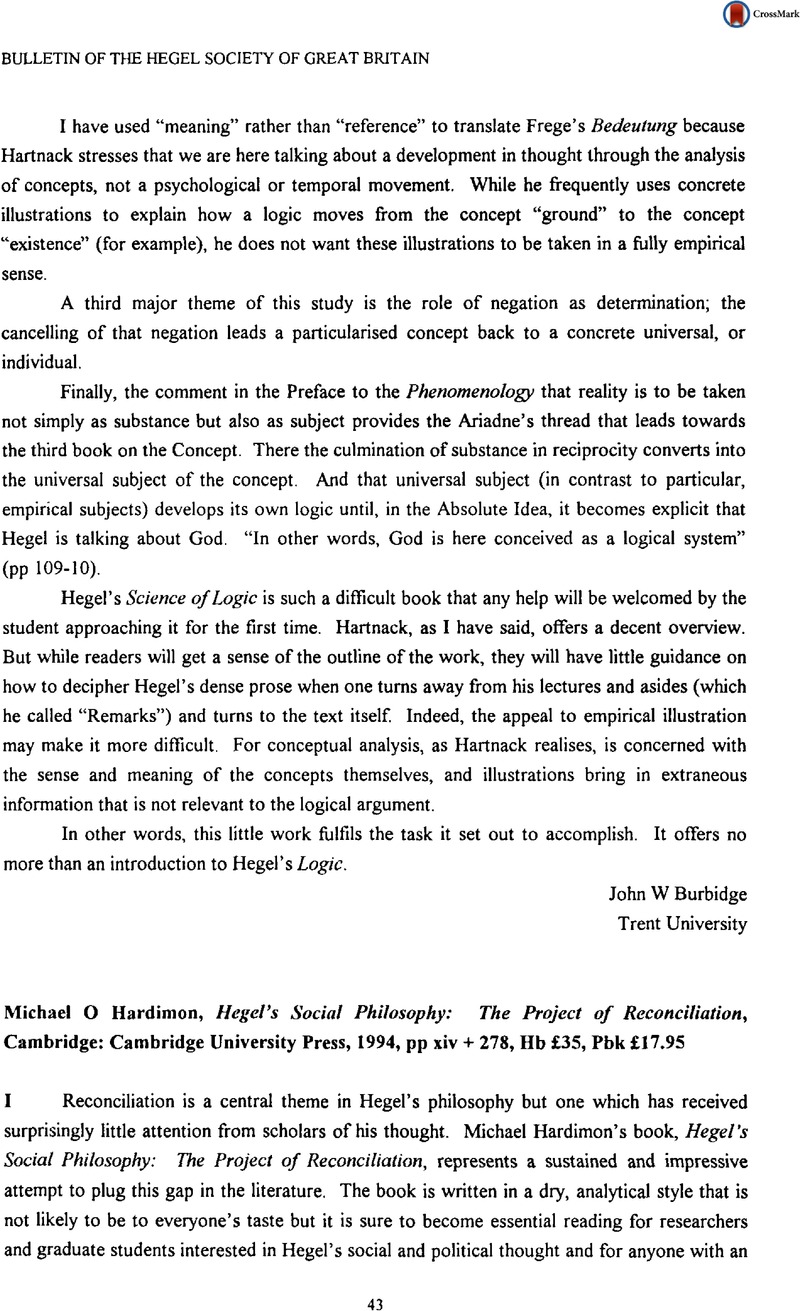Published online by Cambridge University Press: 23 June 2015

1 Bracketed page references are all to Hardimon, Michael O., Hegel's Social Philosophy: The Project of Reconciliation. Cambridge: Cambridge University Press, 1994 CrossRefGoogle Scholar.
2 Hegel, G W F, Lectures on the Philosophy of Religion, 4 vols. Edited by Hodgson, Peter C, translated by Brown, R F, Hodgson, P C, Stewart, J M, with the assistance of Fitzer, J P and Harris, H S. Berkeley and Los Angeles: University of California Press, 1984 Google Scholar.
3 See, for example, Hegel, G W F, Lectures on the Philosophy of Religion, vol 3, p 347 Google Scholar.
4 For instance, see Hegel's discussion of ancient Chinese civilization in Vorlesungen über die Philosophie der Geschichte, in Werke: Theorie Werkausgabe. Frankfurt: Suhrkamp Verlag, 1970, vol 12 Google Scholar.
5 For the distinction between the different stages of reconciliation mentioned in this paragraph, see Hegel, , Lectures on the Philosophy of Religion, vol 3, pp 265–268 Google Scholar.
6 Hegel uses this term, for instance, at Lectures on the Philosophy of Religion, vol 3, p 340 Google Scholar. For the claim that the need for reconciliation arises most acutely in the Christian epoch, see, for instance, Lectures on the Philosophy of Religion, vol 1, p 105 Google Scholar.
7 See Vorlesungen über die Philosophie der Geschichte, p 393, and Lectures on the Philosophy of Religion, vol 3, p 310 Google Scholar, and vol 3, p 109 respectively.
8 Hegel, , Lectures on the Philosophy of Religion, vol 3, p 318 Google Scholar.
9 Hegel, , Lectures on the Philosophy of Religion, vol 2, p 526 Google Scholar.
10 Hegel, , Elements of the Philosophy of Right. Translated by Nisbet, H B, edited by Wood, Allen W. Cambridge: Cambridge University Press, 1991. Paragraphs 5-7CrossRefGoogle Scholar.
11 See Lectures on the Philosophy of Religion, vol 3, pp 211 and 310 Google Scholar for the claim that reconciliation involves a contradiction. For the claim that freedom involves a contradiction, see Hegel, , Vorlesungen über Rechtsphilosophie. Edited by Ilting, K-H, Stuttgart: Fromman Verlag, 1974. vol IV, p 118 Google Scholar.
12 For discussion, see my ‘The Reciprocity Thesis in Kant and Hegel’, Bulletin of the Hegel Society of Great Britain, Issue 33, 1996, and my 1995 Oxford DPhil Dissertation, Hegel's Idea of Freedom: An Interpretation and Defense.
13 See, respectively, Vorlesungen über Rechtsphilosophie, vol IV, p 118 Google Scholar, Elements of the Philosophy of Right, Paras 7 and 24, and Lectures on the Philosophy of Religion, vol 3, p 109 Google Scholar.
14 Eg at Elements of the Philosophy of Right, Para 21.
15 Taylor, Charles, Hegel, Cambridge: Cambridge University Press, 1975, p 373 CrossRefGoogle Scholar.